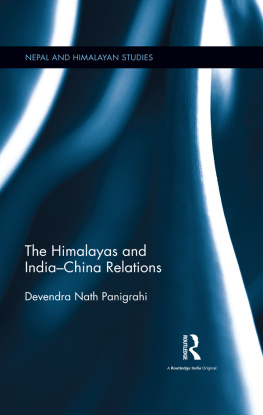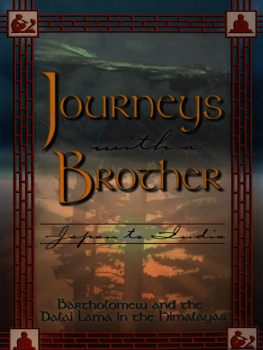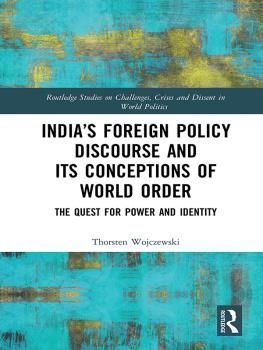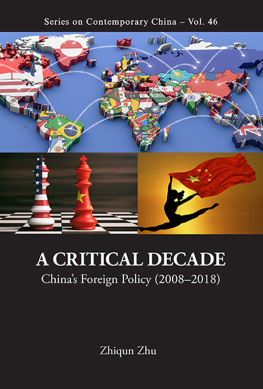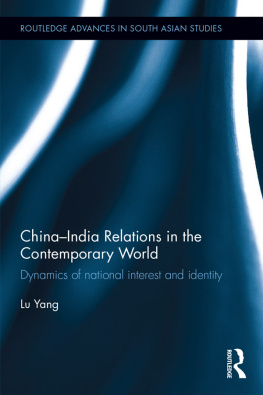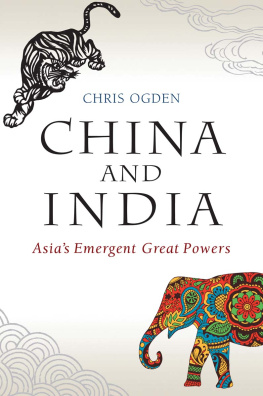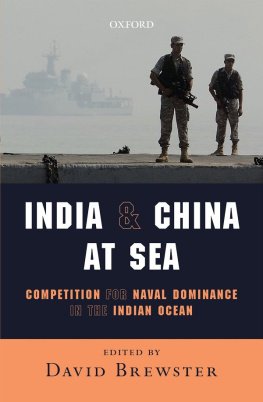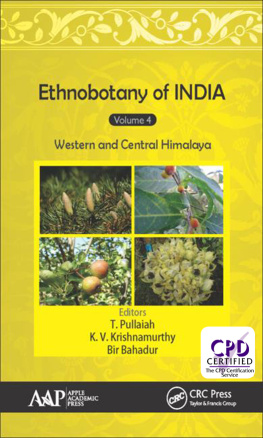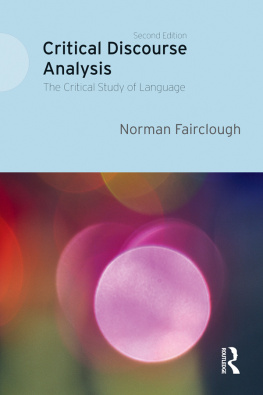The Himalayas and IndiaChina Relations
This book provides a systematic analysis of Chinas rise to power. It traces the complex contours of its relation with India, with the Himalayas prominently figuring in the discourse. Drawing on myths, legends, classical literature, archival resources and contemporary political and international affairs, it brings to the fore several critical issues integral to IndiaChina relations. It also studies the two nations in terms of trade across borders, exchange of ideas and confluence of diverse cultures, imperial strategic rivalries in the colonial period, and recent military skirmishes and diplomatic interaction.
Lucid and explanatory, this volume will interest scholars and researchers in international relations, history, political science and area studies specially those interested in the geopolitics of India and China.
Devendra Nath Panigrahi has served as Senior Lecturer/Reader in History at the University of Delhi. Subsequently, he joined the Nehru Memorial Museum and Library, Teen Murti Bhawan, New Delhi, as Deputy Director. He then served in the Parliament of India as Director of Library and Research Services. He was also Professor of History at the National Council of Educational Research and Training (NCERT), New Delhi, and later Visiting Professor at Jamia Millia Islamia University, New Delhi, India. An alumnus of the Universities of Saugar, Delhi and London, he earned his PhD from the University of London in 1965. His works include Jammu and Kashmir, the Cold War and the West (2009) and Indias Partition: The Story of Imperialism in Retreat (2004).
NEPAL AND HIMALAYAN STUDIES
This series will bring the larger Nepal and the Himalayan region to the centre stage of academic analysis and explore critical questions that confront the region, ranging from society, culture and politics to economy and ecology. The books in the series will examine key themes concerning religion, ethnicity, language, identity, history, tradition, community, polity, democracy, as well as emerging issues regarding environment and development of this unique region.
Books in the series
NEPALI DIASPORA IN A GLOBALISED ERA
Edited by Tanka B. Subba and A. C. Sinha
GODDESSES OF THE KATHMANDU VALLEY
Grace, rage, knowledge
Arun Gupto
THE HIMALAYAS AND INDIACHINA RELATIONS
Devendra Nath Panigrahi
First published 2016
by Routledge
2 Park Square, Milton Park, Abingdon, Oxon OX14 4RN
and by Routledge
711 Third Avenue, New York, NY 10017
Routledge is an imprint of the Taylor & Francis Group, an informa business
2016 Devendra Nath Panigrahi
The right of Devendra Nath Panigrahi to be identified as author of this work has been asserted by him in accordance with sections 77 and 78 of the Copyright, Designs and Patents Act 1988.
All rights reserved. No part of this book may be reprinted or reproduced or utilised in any form or by any electronic, mechanical, or other means, now known or hereafter invented, including photocopying and recording, or in any information storage or retrieval system, without permission in writing from the publishers.
Trademark notice : Product or corporate names may be trademarks or registered trademarks, and are used only for identification and explanation without intent to infringe.
British Library Cataloguing in Publication Data
A catalogue record for this book is available from the British Library
Library of Congress Cataloging in Publication Data
A catalog record has been requested for this book
ISBN: 978-1-138-19117-4 (hbk)
ISBN: 978-1-315-64058-7 (ebk)
Typeset in Sabon
by Apex Covantage, LLC
In fond remembrance of my daughter, Dr. Minoo Nandrajog (3 May 195923 December 2015), who is no more.
Contents
China had long cast its spell in the young minds of my generation, especially after Chinese revolution was accomplished and Peoples Republic of China formed in 1949. My intellectual appetite was whetted when I read through the great epic novel The Good Earth by the Nobel Laureate Pearl S. Buck. I had the good fortune of going through this illuminating and absorbing novel while I was still in the university studying for my masters in 1952. Since then I have kept myself informed about our great and powerful neighbour, China.
The novel was an eye-opener. I was fascinated to read about China that was, as stated by the best-selling author herself on the title page. The book displayed deep insights into the past feudal society of China, in a largely rural setting. Several decades later in 2012, another bestseller epic story of China appeared under the title POW . The author of the novel was also a Nobel Prize winner like Pearl S. Buck. But the story was not about the people clinging to land, as termed by Pearl S. Buck, but about rather a small town considered a modern town, in the midst of the urban jungle of China.
Both novels, however, depicted in their narratives similar universal human sentiments. If one were to sum up the main elements of the narratives, one could say they were about human greed, lust for power, domination and slavery, passion, exploitation, poverty and deprivations and weaknesses of human flesh in all its forms. The typical Chinese life, as gleaned through these pages of absorbing stories, appears to be total absence of any religious creed, beliefs or philosophy of life: no talk either of gods or goddesses, or other worldliness, and hardly any place even for Confucian morality or religious rites of Buddhism. Everybody seemed involved in his or her mundane affairs. The revolution came, as it were, in the nature of things, and was welcomed by a large majority of Chinese people. The minority who did not sympathize with the revolution was liquidated.
Joseph Needhams monumental 20 volumes Science and Civilization in China provide unparalleled insights into Chinese society and have enriched our knowledge of Chinese society and civilization from the earliest times to the modern era. Eric Hobsbawm has very rightly observed that Needhams re-construction of Science and Civilization in China points out to the fact about a civilization based on morality without supernaturalism, a great culture based not on doctrine of original sin, a country where no priesthood ever dominated.
Keeping these basic elements in mind, an attempt is made to understand the nature and greatness and weaknesses of Chinese political culture in this book. I extend my deepest sense of gratefulness to the great teacher Joseph Needham of Cambridge University for educating persons like me through his seminal writings.
When I began the study many friends expressed their serious misgivings about the success of my venture. A well-meaning Marxist friend asked whether I knew Chinese. For one thing, most of them were reluctant to appreciate my undertaking such a study. China was controversial. Most people, I have come across, generally considered that our borders were unsafe owing to Chinese rise to power and its apparent aggressive stance. Nevertheless, I plunged into this study, especially after my book on Kashmir was published in 2009. It was exciting to cross over the Himalayas to unravel the mystery of Tibetan people and others inhabiting beyond.
While I appreciated the traditional wisdom regarding the language requirement for a close study of any country with a different culture and language, I argued that in this modern world of today, one could still acquire ample knowledge about China through published and archival sources available in the world in English language. Also I cited the example of two of my close relatives who are engaged in trading activities in China during the past ten to fifteen years and minting millions without their knowledge of Chinese. Of course, I know that buying and selling of goods is not the same as writing, yet I embarked on this project with full faith.

